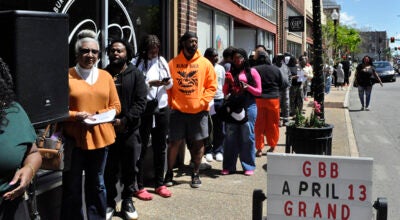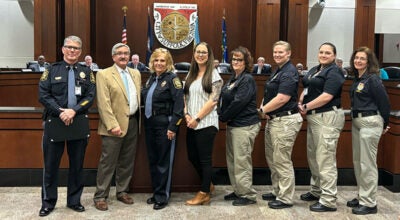Obici graduates a special class
Published 10:59 pm Thursday, December 10, 2009
In some ways, it was a typical graduation.
There were diplomas, a speaker, a walk down the aisle, proud parents and even a minister to deliver a blessing on the graduates.
Each of those graduates, however, had four legs and padded along on a leash beside a handler. The class truly had gone to the dogs.
This is the fifth year that Sentara Obici Hospital has graduated a class of “Kanine Kandystripers,” and on Thursday a crowd of appreciative onlookers gathered in the hospital’s lobby to admire the dogs and their handlers and to wish them well in their work at the hospital.
Already this year, volunteers and their dogs — certified by Therapy Dog International — have spent more than 192 hours at Obici, making more than 9,000 contacts with patients, physicians and hospital guests, according to Lydia Dunkailo, a recreational therapist and coordinator of the Kanine Kandystripers program at Obici.
Obici has 42 dogs and their handlers working in teams on various days of the week, Dunkailo said.
The dogs are allowed into just about all areas of the hospital — only the cafeteria, and the medicine rooms, isolation rooms and rooms with immuno-suppressed patients are off limits.
Handlers visit patient rooms, waiting areas and even staff spaces throughout the hospital. If a patient agrees to have a dog come into his room, the handler and dog spend a few minutes there.
“He puts many a smile on people’s faces when he visits,” Handler Raymond Cross said of his pit bull, Dallas, who was one of 22 dogs to graduate from the hospital’s training program this year.
As a pit bull, Dallas often exceeds people’s expectations of him, Cross said, noting that even those involved with the program may have been a bit wary of his dog at first.
“Everybody watches him a little bit closer at first, I guess,” Cross said, as he held onto the leash attached to the collar Dallas wore as he lay sedately on the cool floor of the hospital foyer. “It’s just because of what you hear [about his breed].”
In fact, Dallas and all of the other dogs graduating on Thursday are expected to be gentle and able to deal with the distractions present in a hospital — sounding alarms, rolling carts and strong odors — and they are expected to spend at least two hours a month in the hospital.
The benefits of their visits can be important to patients. Lower blood pressure and pulse rate, reduced stress and boredom, increased social interactions and exercise are among those benefits, according to a Sentara flyer about the canine program.
And there are benefits for the handlers, the dogs and even the staff.
“It’s a feel-good evening,” said Bill Owen, whose Bernese mountain dog Ella graduated on Thursday. “To see the dogs enjoy their work and to see the reactions of the patients and the patients’ family members. And you’d be amazed at how much the staff appreciates it.”
Ella is the second therapy dog Owen and his wife have had in the program. They were members of the first graduating class at Obici in 2004 with a dog that has since died, he said.
The hospital honors its canines and handlers who have died with a special plaque and by including their names on the graduation announcements.
And Dunkailo considers the dogs almost a part of her family.
“I’ve got three cats at home and 42 dogs at work,” she said.
To learn more about getting involved in the program, call Dunkailo at 934-4856.





